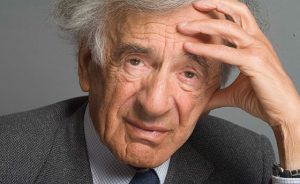 Elie Wiesel transformed his own suffering and loss during the Holocaust into teachings about what it means to live. He relied on our sacred texts to elevate our lives toward justice and compassion. He took words seriously, emphasizing that they defined character and were precursors to action. In dedicating the Holocaust Memorial Museum in 1993, he said it “is not an answer; it is a question mark. If there is a response, it is a response in responsibility.”
Elie Wiesel transformed his own suffering and loss during the Holocaust into teachings about what it means to live. He relied on our sacred texts to elevate our lives toward justice and compassion. He took words seriously, emphasizing that they defined character and were precursors to action. In dedicating the Holocaust Memorial Museum in 1993, he said it “is not an answer; it is a question mark. If there is a response, it is a response in responsibility.”
Elie and Marion had one child, Elisha, who is now a partner at Goldman Sachs. As a young man he said, “It is not easy to have a dad who is the conscience of the world.” Elisha stayed out of the public eye. Now, five months after his father’s passing, Elisha spoke honoring his dad at the United States Holocaust Memorial Museum in Washington. Leaders of both political parties presented tributes, too, including Representative Nancy Pelosi and Senator Orrin Hatch.
Elisha spoke as his father’s son. “Here is what we are commanded to do over and over and over again,” said the younger Wiesel, quoting from Exodus and other biblical passages: “And a stranger shalt thou not wrong, neither shall you oppress him, for you were strangers in the land of Egypt. A stranger you shall not oppress for you know the heart of a stranger. You were strangers in the land of Egypt. The stranger that travels with you shall be unto you as the home-born among you and you shall love him as yourself, for you were strangers in the land of Egypt.”
And then, Elisha applied that teaching: “When Syrian refugees need our help, we must help them. When Muslims in our midst are made to feel that they won’t have the same rights as the rest of us we must embrace them. When children of hardworking, law-abiding undocumented immigrants fear deportation we must insist on compassion.”
Wiesel then added to the list of entities the LGBT community and Israel, which Wiesel said is “treated as the world villain simply for making sure that Jews will never again be without a home.”
“In this museum, whose fundamental premise is that we must never again allow ourselves to condemn ‘the other’ simply for being ‘the other,’ is there any question about the scope of the work ahead for all of us in the coming years?”
The younger Wiesel said that his father would not have isolated those with whom he disagreed and pleaded for an end to the post-election rancor between supporters and opponents of Trump.
“In seeking to change hearts and minds and create a more tolerant society, there is a danger we may treat those opinions we find offensive as ‘the other’ in turn,” he said. “This was not my father’s way. He was not a shouter. And he did not belittle those he disagreed with. He spoke to them. He listened.”
He concluded: “I do not think he would unfriend people on Facebook no matter how they voted.”
I deeply miss my teacher and friend, Elie Wiesel. Elisha absorbed his father’s teachings and courage. I imagine Elie listening to his son’s tribute with deep satisfaction and a smile and more, challenging us to respond to those words as a collective responsibility.
Rabbi Spitz is a caring mentor to his congregants, a scholar, and a member of the Rabbinical Assembly Committee of Law and Standards. He lives in Tustin, California with his wife, Linda; they are the parents of Joseph, Jonathan and Anna Rose.






